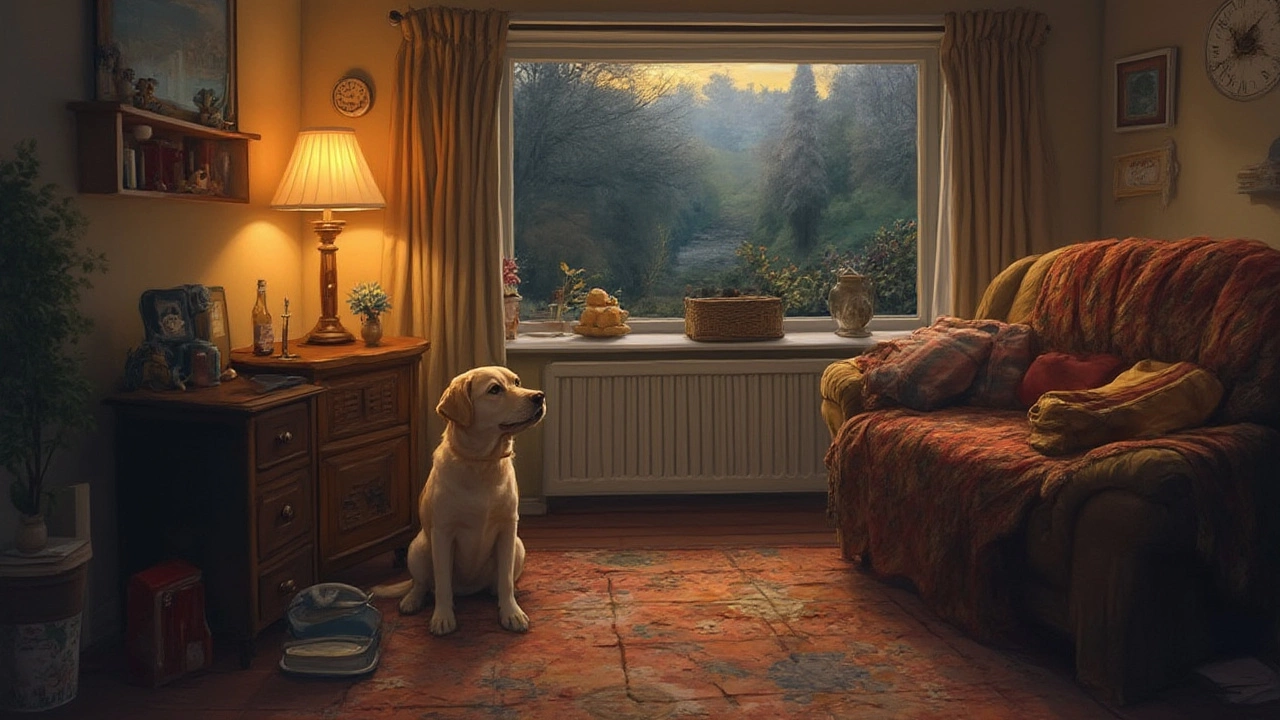Imagine settling in to binge your favorite show, only to remember your dog still hasn’t had his dinner. Ever pondered whether those late-night feedings make any real difference? Turns out, the clock matters — a lot more than most pet owners think. The time you give your dog their last meal can affect everything from energy levels and stomach health to how much sleep you both get (trust me, nobody likes a midnight potty emergency). Ready to find out why?
Why Timing Matters: Understanding Your Dog’s Internal Clock
Dogs aren’t just four-legged garbage disposals — their biological clocks, or circadian rhythms, actually sync up with their environment much like ours. When you feed your dog at random times or too close to bedtime, it can disrupt that inner tick-tock. In fact, research from Cornell University's College of Veterinary Medicine points out that consistent feeding times help regulate hormones like insulin and cortisol, which play a big role in appetite, stress, and even body fat. Imagine your pooch’s body getting all the wrong messages just because you fed them a couple of hours later than usual — that’s a recipe for crankiness, restlessness, and, for some dogs, weight gain.
A late dinner means digestion runs while your dog is supposed to be settling down. The process of digestion increases heart rate, raises core body temperature, and signals the body to stay alert. That’s one reason why feeding your pup just before your own bedtime can have you both wide awake at 3 a.m. looking for the nearest patch of grass. And for puppies or senior pups with sensitive stomachs, food that’s not fully digested by bedtime can lead to accidents (no fun, especially with carpet).
So how late is too late? The consensus among most veterinarians lands on feeding your dog at least three hours before lights out. If you sleep around 10 p.m., that means dinner time should wrap up by 7 p.m. at the latest. This gives your dog a window to digest, process, and—yes—make their last trip outside so you can all sleep easy. It’s also key for keeping energy levels even throughout the evening, so you don’t end up with a dog who’s suddenly turbocharged right when you least want it.
Real-world example: My own border collie used to eat dinner around 9 p.m. He’d toss and turn, need water, and beg to go outside at midnight. After nudging his meal back to 6:30 p.m.? He now sleeps soundly till 6 a.m. — and so do I.
If you find yourself stuck in a late-night routine, change doesn’t have to be abrupt. Gradually nudge meals earlier by 15-20 minutes every few days. Your dog’s digestive system will thank you, and you’ll notice real improvements in mood and sleep in a matter of days.
How Your Dog’s Age and Breed Change the Feeding Equation
Puppies, energetic adults, and senior dogs all come with different feeding quirks. For puppies, spacing meals evenly matters way more. Those little tummies can handle only small amounts at once, and waiting too long between meals sets the stage for low blood sugar. For most puppies under six months, three to four meals a day is the sweet spot, with the last meal ideally around 5:30–6:00 p.m. That way, there’s enough time for a bathroom break before lights out.
Adult dogs (between 1–7 years for most breeds) usually thrive on two meals a day, spaced about 10–12 hours apart. Skipping meals or cramming both into the evening can mess with digestion and energy. If you work odd hours or your dog gets anxious waiting for dinnertime, set an alarm or use a timed automatic feeder — consistency beats flexibility here.
Now, big breeds like Great Danes or German Shepherds are prone to bloat—a dangerous and sometimes deadly twisting of the stomach linked to eating too fast or too close to strenuous activity. For these breeds, it’s critical to let them rest before or after eating. Smaller breeds, on the other hand, burn calories quicker and may need you to offer the evening meal a little closer to bedtime, but never less than two hours out. Talk to your vet for advice tailored to your dog’s size and quirks.
Seniors often do better with lighter evening meals. As metabolism slows and joint pain creeps up, heavy late-night eating puts extra pressure on bladder and bowels. No surprise, it often means more nighttime begging to go outside. If your older dog is pacing at 2 a.m., try shifting dinner earlier and offering a tiny, easy-to-digest snack right before bed (like a couple of bites of lean chicken or their own kibble), which can stave off hunger without triggering major digestion drama.
Straightforward tip: Track your dog’s reaction over a week after adjusting dinner time. If you see better sleep, improved mood, or a drop in ‘potty emergencies,’ you’re on the right track. Be patient — habits take time to shift, but dogs are surprisingly adaptable if you’re consistent. Here’s a handy reference for feeding times by age group:
| Dog Age | Recommended Last Meal Time | Notes |
|---|---|---|
| Puppies (up to 6 months) | 5:00–6:00 p.m. | Multiple meals, no late snacks |
| Adults (1–7 years) | 6:00–7:00 p.m. | Two meals per day optimal |
| Seniors (7+ years) | 5:00–6:30 p.m. | Lighter dinner, possible small bedtime snack |

Feeding Schedules and Their Impact on Health and Behavior
Ever noticed your dog bouncing with energy at midnight or, conversely, dragging through morning walks? Feeding times shape these patterns more than most people realize. A set evening meal helps set your dog’s daily rhythm, which ties straight into hormone levels, sleep cycles, and even training success. A 2021 study from the University of Lincoln in the UK found that dogs with variable feeding times had higher cortisol (the stress hormone) compared to those on regular schedules. High cortisol equals more anxiety, more barking, more chewing your favorite shoes — all things nobody needs.
Food in the stomach also triggers an uptick in metabolism and energy, so late meals can mean wild zoomies or restless sleep. On the flip side, going too long without food overnight triggers hunger hormones that mess with metabolism and, in some cases, lead to begging and even digestive upsets like vomiting bile in the early morning. Balanced timing is everything.
If your goal is easy, accident-free nights, consider this typical evening routine for an average adult dog (like a Labrador or beagle):
- 6:00–6:30 p.m.: Dinner served
- 7:00 p.m.: Gentle walk or bathroom break
- 9:30–10:00 p.m.: Final outdoor potty break
- 10:00 p.m.: Bedtime
This gives your dog time to process food, burn a little energy, and empty the bladder before sleep. Not only do dogs sleep better, but you will too.
Behavior issues linked to feeding times are sneaky. Got a chewer, a barker, or a dog who wakes you before dawn? Track your evening schedule. Sometimes a late meal is fueling nocturnal shenanigans. For dogs who struggle with separation anxiety, sticking to a predictable meal and potty routine at night helps reduce stress — they know what’s coming and can relax.
Another fun fact: Dogs trained for agility or advanced obedience often eat earlier in the evening since late food in the stomach makes jumping, running, or even sitting still uncomfortable. Trainers will often feed the last meal by 5:30–6:00 p.m. and save training sessions for pre-dinnertime, so meals become a reward rather than a distraction. Even for couch potatoes, a similar pattern helps keep nights drama-free.
Compare a random meal schedule to a set one for a couple of weeks. You’ll be shocked how quickly behavior shifts for the better. Jot down bathroom needs, sleep patterns, and energy levels after the new schedule — these real-world cues will tell you if your chosen time is working.
Tips for Making the Switch (And What to Avoid)
Ready to shift your dog’s meal to an earlier hour? It’s easier than you’d think, especially if you approach it gradually. Here’s how:
- Start moving dinner 15–20 minutes earlier every two to three days, instead of jumping to a new hour right away. This avoids tummy surprises or hunger protests.
- Use treats or a tiny snack at the old meal time if your dog begs — but keep it tiny and healthy (like a carrot slice or a piece of their own kibble).
- Pair the new schedule with added evening routines, like a walk after the meal. This helps the new pattern stick in their mind.
- Watch for signs of hunger or discomfort. If your dog wakes hungry at 4 a.m., consider a tiny bedtime snack, but never use people food or rich treats — stick to their usual kibble or dog-safe options.
- If you have a multi-dog household, expect a little chaos at first as everyone adjusts. Consistency pays off; in a week or two, the new routine will feel normal for everyone.
Avoid feeding your dog right before bed, even if you’re running late. If you absolutely must serve a late meal, keep it light and plain. Skip fatty foods or heavy kibble and avoid treats with sugar or artificial flavors after 7 p.m. — these can trigger thirst, restlessness, and late-night bathroom calls.
If your pup has medical issues (like diabetes, gastritis, or is recovering from surgery), talk to your vet before making any changes. Some dogs require a more tailored approach, especially if they rely on medication given with meals.
Don’t forget water! Some owners try to limit water in hopes of avoiding bathroom trips, but moderate water access should continue throughout the evening. Removing the bowl can cause dehydration or behavioral issues — a dry-mouth dog is a cranky housemate.
If you travel or your schedule changes often, use programmable feeders or set calendar reminders so feeding times don’t slip. Dogs thrive on routine, and your life will feel more predictable too.
A quick recap of meal time best practices:
- Serve the last meal three hours before bedtime.
- Adjust dinnertimes based on age and breed.
- Keep a consistent schedule, even on weekends.
- Watch for positive changes in sleep and bathroom habits.
- Always consult a vet when tweaking the schedule for medical reasons.
Making this one small shift — knowing what time you should stop feeding your dog at night — can seriously upgrade your dog’s health and your own sanity. Happy early dinners, and even happier evenings!
